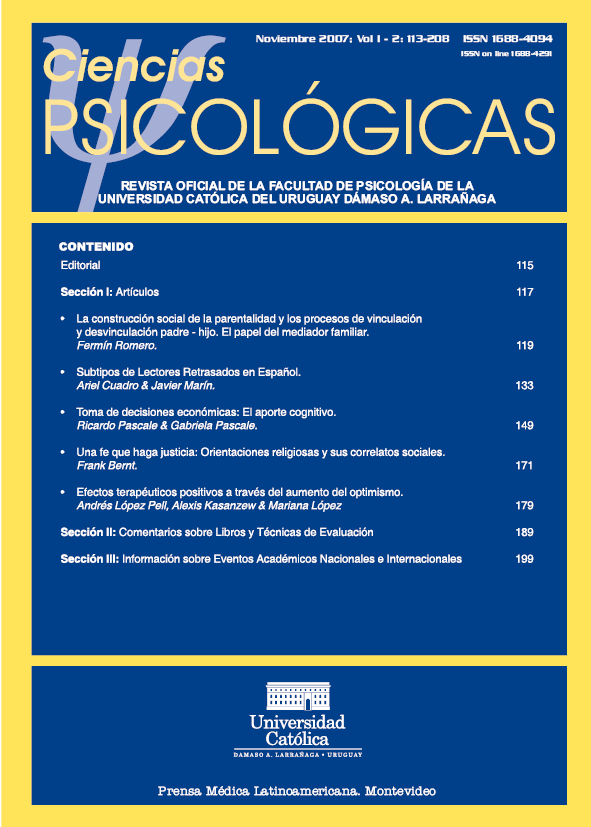UNA FE QUE HAGA JUSTICIA: ORIENTACIONES RELIGIOSAS Y SUS CORRELATOS SOCIALES
DOI:
https://doi.org/10.22235/cp.v0i1.568Palavras-chave:
Orientación Religiosa, Altruismo, PrejuicioResumo
Se presenta un panorama de las investigaciones que vinculan las medidas de orientación religiosa con las actitudes y conductas sociales y antisociales. Se consideran además, por un lado, los resultados de varias escalas de religiosidad y por el otro, su relación con las que registran actitudes y conductas prosociales y antisociales (i.e., caridad y altruismo versus prejuicio y discriminación). Como conclusión, se incluyen algunas implicaciones, así como, se proponen algunas direcciones para investigaciones futuras sobre dicha relación.
Downloads
Referências
Allport, G. W. (1954). The nature of prejudice. Cambridge, MA: Addison-Wesley.
Allport, G. W., & Ross, J. M. (1967). Personal religious orientation and prejudice. Journal of Personality and Social Psychology, 5, 432-443.
Altemeyer, B. & Hunsberger, B. (1992). Authoritarianism, religious fundamentalism, quest, and prejudice. International Journal for the
Psychology of Religion, 2, 113-133.
Armstrong, K. (1993). A history of God: The 4,000- year quest of Judaism, Christianity and Islam. New York: Alfred A Knopf, Inc.
Aaron, A. & McLaughlin-Volpe, T. (2002). Including others in the self. In C. Sedikides & M. B. Brewer (Eds.), Individual self, relational self, Collective self (pp. 89-108). Philadelphia: Psychology Press.
Arrupe, P. (1980). Justice with faith today. Ed. J. Aixala. St. Louis, MO: Institute of Jesuit Sources.
Arterburn, S., & Fèlton, J. (2001). Toxic faith: Experiencing healing over painful spiritual abuse. New York: Random House.
Batson, C. D., Eidelman, S. H., Higley, S. L., & Russell, S. A. (2001). “And who is my neighbor?”: II.Quest religion as a source of universal
compassion. Journal for the Scientific Study of Religion, 40, 39-50.
Batson, C. D., Flink, C. H., Schoenrade, P. A., Fultz, J., & Pych, V. (1986). Religious orientation and overt versus covert racial prejudice. Journal of Personality and Social Psychology, 50 (1), 175-181.
Batson, C. D., Floyd, R. B., Meyer, J. M., & Winner, A. L. (1999). “And who is my neighbor?:” Intrinsic religion as a source of universal compassion. Journal for the Scientific Study of Religion, 38 (4), 445-457.
Batson, C. D., & Gray, R. A. (1981). Religious orientation and helping behavior: Responding to one’s own or to the victim’s needs? Journal of
Personality and Social Psychology, 40, 511-520.
Batson, C. D., Schoenrade, P., & Ventis, W. L. (1993). Religion and the individual: A socialpsychological perspective. New York: Oxford University Press.
Batson, C. D., & Ventis, W. L. (1982). The religious experience: A social-psychological perspective. New York: Oxford University Press.
Bernt, F. M. (1989). Being religious and being altruistic: A study of college service volunteers. Personality and Individual Differences, 10, 663- 669.
Bernt, F. M. (1999). Religious commitment, attributional style, and gender as predictors of undergraduate volunteer behavior. Journal of
Psychology and Theology, 27, 3, 261-272.
Bernt, F. M. (2005). Abrazar al Forastero entre Nosotros: Actitudes Estadounidenses Sobre la Inmigración Latinoamericana. Conferencia presentada en el Congreso de la Sociedad Interamericana de Psicólogos, Buenos Aires, Argentina.
Darley, J. M., & Batson, C. D. (1973). “From Jerusalem to Jericho”: A study of situational and dispositional variables in helping behavior.
Journal of Personality and Social Psychology, 27, 100-108.
Duck, R. J., & Hunsberger, B. (1999). Religious orientation and prejudice: The role of religious proscription, right-wing authoritarianism, and social desirability. International Journal for the Psychology of Religion, 9 (3), 157-189.
Freud, S. (1961). The future of an illusion (J. Strachey, Trans.). New York: Norton. (original work published 1927).
Gaertner, S. L., & Dovidio, J. F., (1986). The aversive form of racism. In J. F. Dovidio & S. L. Gaertner (Eds.), Prejudice, discrimination, and racism (pp. 61-89). Orlando, FL: Academic Press.
Gorsuch, R. L., & Aleshire, D. (1974). Christian faith and ethnic prejudice: A review and interpretation of research. Journal for the Scientific Study of Religion, 13, 281-307.
Green, J. C. (2003). A liberal dynamo: The political activism of the Unitarian-Universalistic clergy. Journal for the Scientific Study of Religion, 42 (4), 577-590.
Hunsberger, B., & Jackson, L. (2005). Religion, meaning, and prejudice. Journal of Social Issues. 61 (4), 807-826.
Jackson, L. M., & Esses, V. M. (1997). Of scripture and ascription: The relation between religious fundamentalism and intergroup helping.
Personality and Social Psychology Bulletin, 23, 893-906.
James, W. (1985). The varieties of religious experience. Cambridge, MA: Harvard University Press. (Original work published 1902).
Lawrence, R. T. (1997). Measuring the image of God: The God Image Inventory and the God Image Scales. Journal of Psychology and theology, 25 (2), 214-226.
Lipkus, I. (1991). The construction and preliminary validation of a Global Belief in a Just World Scale and the exploratory analysis of the Multidimensional Belief in a Just World Scale. Personality and Individual Differences, 12, 1171-1178.
Pargament, K. (1992). Of means and ends: Religion and the search for significance. International Journal for the Psychology of Religion, 2, 201-229.
Pettigrew, T. F. (1998). Generalized intergroup contact effects on prejudice. Personality and Social Psychology Bulletin, 23, 173-185.
Sears, D. O., & Henry, P. J. (2003). The origins of symbolic racism. Journal of Personality and Social Psychology, 85 (2), 259-275.
Sears, D. O. (1988). Symbolic racism. In P. Katz & D. Taylor (Eds.), Eliminating racism: Profiles in controversy (pp. 53-84). New York: Plenum Press.
Snook, S. C., & Gorsuch, R. L. (1985). Religion and racial prejudice in South Africa. Paper presented at the annual convention of the American
Psychological Association, Los Angeles.
Spilka, B., Hood, R. W., Jr., Hunsberger, B., & Gorsuch, R. (2003). The psychology of religion: An empirical approach. Third Editions. New York: The Guilford Press.
















